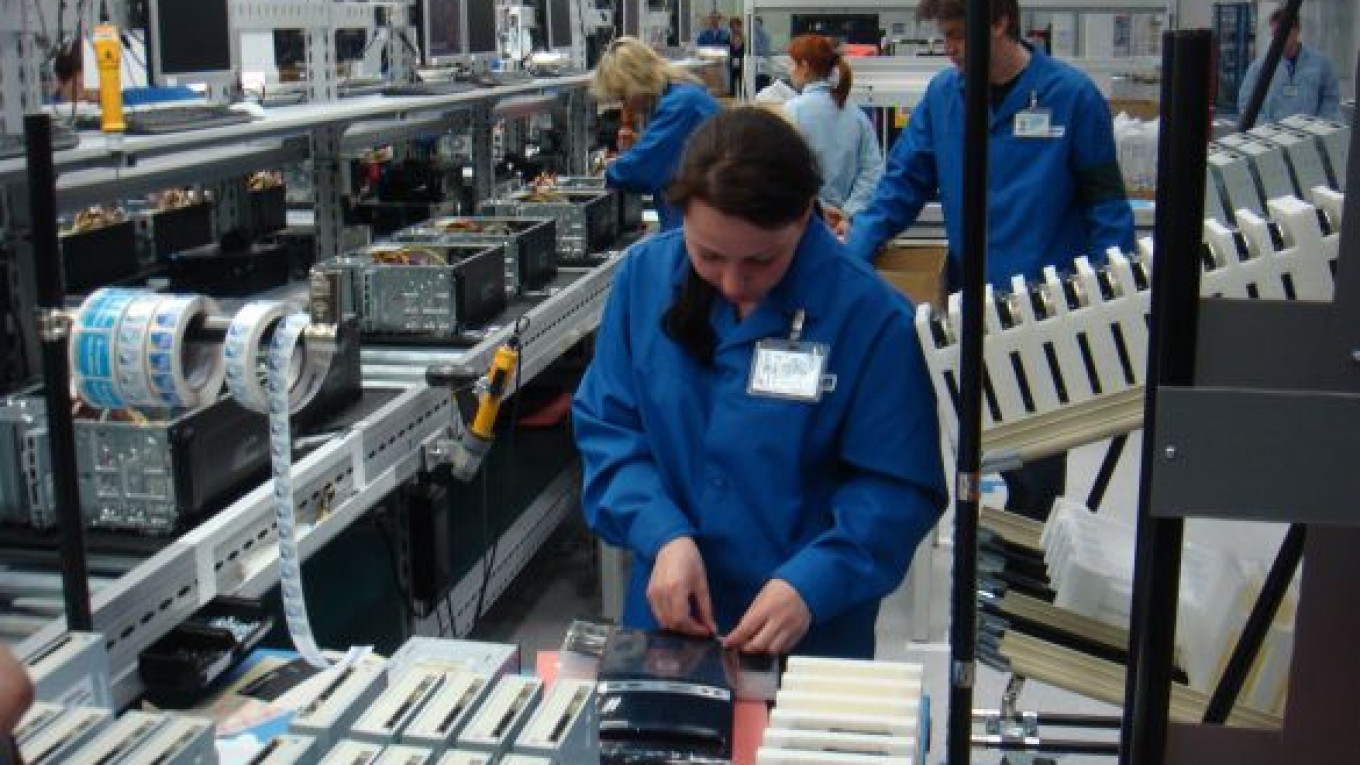ST. PETERSBURG — Hewlett-Packard and component maker Foxconn opened a pilot assembly line to make computers in St. Petersburg on Wednesday, but the partners offered few details on when their main production facility would be finished.
The companies were also reluctant to discuss the economic viability of the project, which they first announced in May 2008. At the time, the 32,000-square-meter main facility was expected to cost $50 million and have an annual capacity of 500,000 personal computers.
The ceremony, attended by senior local officials including Governor Valentina Matviyenko, offered the U.S. computer giant a welcome opportunity to showcase its investment in Russia after investigators raided its Moscow offices as part of a corruption probe earlier this month.
German investigators have said they suspect that HP executives gave millions of dollars in bribes to officials at the Prosecutor General's Office in 2002 and 2003 to win supply contracts. Russia's current top prosecutor, Yury Chaika, said Wednesday that the investigation was ongoing and that criminal cases could still be opened.
"If there's every reason and they hand us the materials, then naturally a criminal case will be opened. So far, we don't have that information," Chaika said during a hearing in the Federation Council, Interfax reported.
HP said it would not be commenting on the investigation Wednesday, and the companies were nearly as tight-lipped on the prospects for their main Foxconn Rus facility, initially planned to be on line by spring 2009.
Jim Chang, executive vice president of Taiwan-based Ho Hai Precision Group, owner of Foxconn, said the plant would "probably not be finished this year" and could exceed initial cost expectations.
“Two years ago when we started this project, we announced the figure of $50 million,” he said. “We are still in the process of making our investment, but I have a feeling we may go beyond this figure.”
The main factory in Kolpino, a suburb in southern St. Petersburg, was supposed to be launched first, but because of the recession, the partners agreed to start with a pilot production line on a rented 10,000-square-meter facility in nearby Shushary, HP and Foxconn said in a joint statement.
The line, operating in test mode since the start of the year, will produce HP, HP Pro and Compaq models. It will initially employ 100 workers, although the staff will grow as production increases.
Eric Cador, HP's senior vice president in Europe, the Middle East and Africa, said the production pace would “be driven by demand.”
The assembly line will produce up to 40,000 PCs per month. HP is now negotiating with its Russian partners on distribution, the statement said.
When asked by reporters about the logic of localizing in Russia rather than importing from China, Chang conceded that the project had obstacles to overcome, at least in the short term.
“Like any company, from the efficiency point of view, we’d like to see ourselves in a profitable position, but we are realists. At least at the beginning, this will not be a profitable project,” he said. “We’ll have to learn, but we are historically fast learners, so I’m optimistic about it.”
He did not say when the investors might break even on the project, which Cador called a long-term investment.
“We are here for the long prospective, so I think it will be profitable after all,” Cador said.
The main benefit to consumers, he said, will be faster access to new technology, since all updates will be made locally. When reporters asked whether the localization would reduce costs, St. Petersburg Deputy Governor Mikhail Oseyevsky stepped in to note that "every college student knows … the price is defined by the basic ratio of supply and demand."
Matviyenko, who was on hand for the project's announcement in May 2008, said Wednesday that there was a good reason her city was chosen for the high-tech production.
“The first radio and the first TV in Russia were made in St. Petersburg, so we have a long tradition of innovation here,” she said. “We as a government are doing our best to create a high-tech cluster, and this factory will become the first of its kind.”
She then pressed a symbolic blue button to launch production and granted the first 20 computers made there to a local school.
A Message from The Moscow Times:
Dear readers,
We are facing unprecedented challenges. Russia's Prosecutor General's Office has designated The Moscow Times as an "undesirable" organization, criminalizing our work and putting our staff at risk of prosecution. This follows our earlier unjust labeling as a "foreign agent."
These actions are direct attempts to silence independent journalism in Russia. The authorities claim our work "discredits the decisions of the Russian leadership." We see things differently: we strive to provide accurate, unbiased reporting on Russia.
We, the journalists of The Moscow Times, refuse to be silenced. But to continue our work, we need your help.
Your support, no matter how small, makes a world of difference. If you can, please support us monthly starting from just $2. It's quick to set up, and every contribution makes a significant impact.
By supporting The Moscow Times, you're defending open, independent journalism in the face of repression. Thank you for standing with us.
Remind me later.


